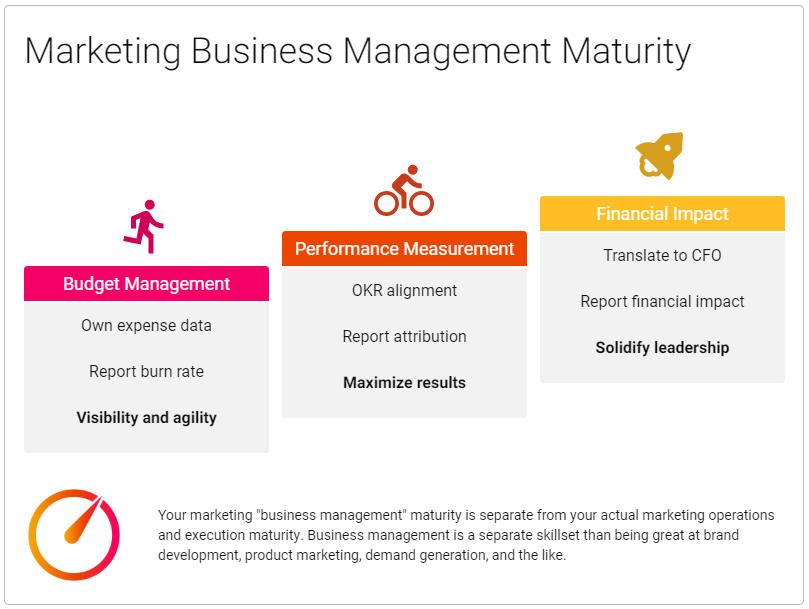I get it, we're Marketers because Accounting is boring. But as CMO, you won't get far if you don't speak CFO and CEO fluently. To be a successful marketing leader, you have to be able to answer the question “What business value has our marketing investment produced?” Espousing OKRs, KPIs, MQLs, SQLs, and CPCs is absolutely necessary - yes - but if you stop there, you're done for.
If you want to:
- Leave no doubt about marketing's business impact
- Expand your involvement in strategic direction
- Determine the budget instead of just accepting one
Then you must manage the expenses. Why? You have to demonstrate financial acumen and fiscal responsibility. “Leave no dollar behind”. You've been given valuable resources, no matter how big or small your budget - be maniacal about accounting for every dollar.
Also, you need to know first-hand how much budget you have remaining so you can be agile with your marketing plan. If Finance assures you they've got it covered and you don't need to manage the expenses… so what, duplicate the effort and still manage your budget. You cannot effectively manage your marketing plan if you don't have immediate access to your budget - what's spent, what's contracted, what's planned - and what's completely unallocated.
Rock solid expense management is fundamental to the first stage in your Marketing Business Management Maturity.

Make Data (and Dollar) Driven Decisions
When you control the expense management, you're no longer reliant on the timing and priorities of others. Successful marketers move fast and are able to pivot on a dime. You're making data-driven decisions based on lead volume, conversion rates, win rates; but you have to make dollar-driven decisions based on balancing your spend across brand, demand, experience programs as well as operations; and comparing overall return and return on investment. Two very different things.
Prove Financial Impact
When you control the expense management, you can translate your marketing metrics into financial metrics such as Return on Marketing Investment (ROMI), Cost per Outcome (CPO), and Customer Acquisition Cost (CAC). If you're reliant on someone else's timing, priorities, and data that is defined for accounting and not marketing, your hands will be tied.
Speak CEO and CFO
When you control the expense management, you are in the driver's seat when it comes to providing valuable business insights that the C-suite and the board cares about. Let's face it, many organizations don't intuitevly get that marketing is extremely pervasive (touches everything about the business), extremely complex (customer journey maps look like spaghetti), and just as much art as it is science. We can gripe about it, or we can accept it and address it. The CMO has an incredible hill to climb to establish the trust and credibility necessary to be given the leeway to do the job well.
And so, as CMO you must be maniacal about expense management. It is fundamental that you own the data, the data is pristine, and the data is immediately available. It's an essential component for you to answer, “What business value has our marketing investment produced?”